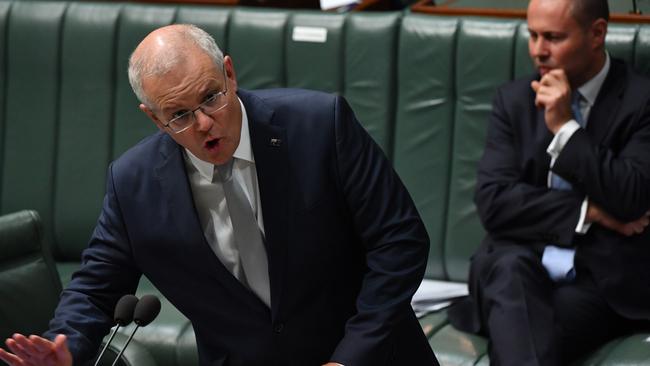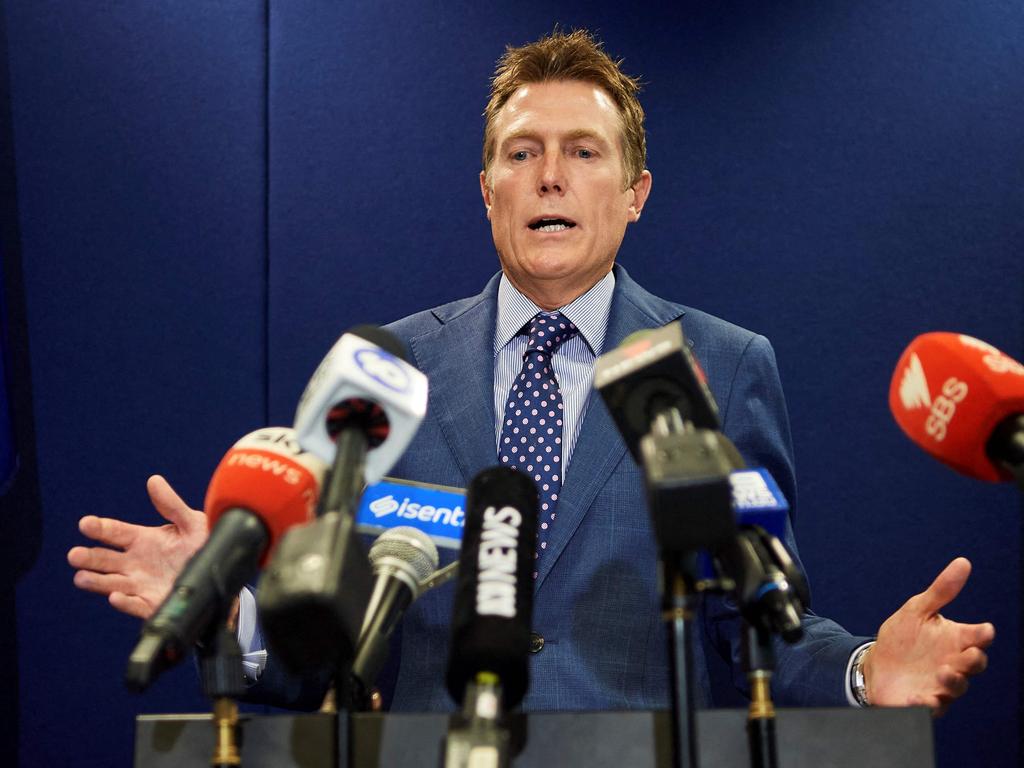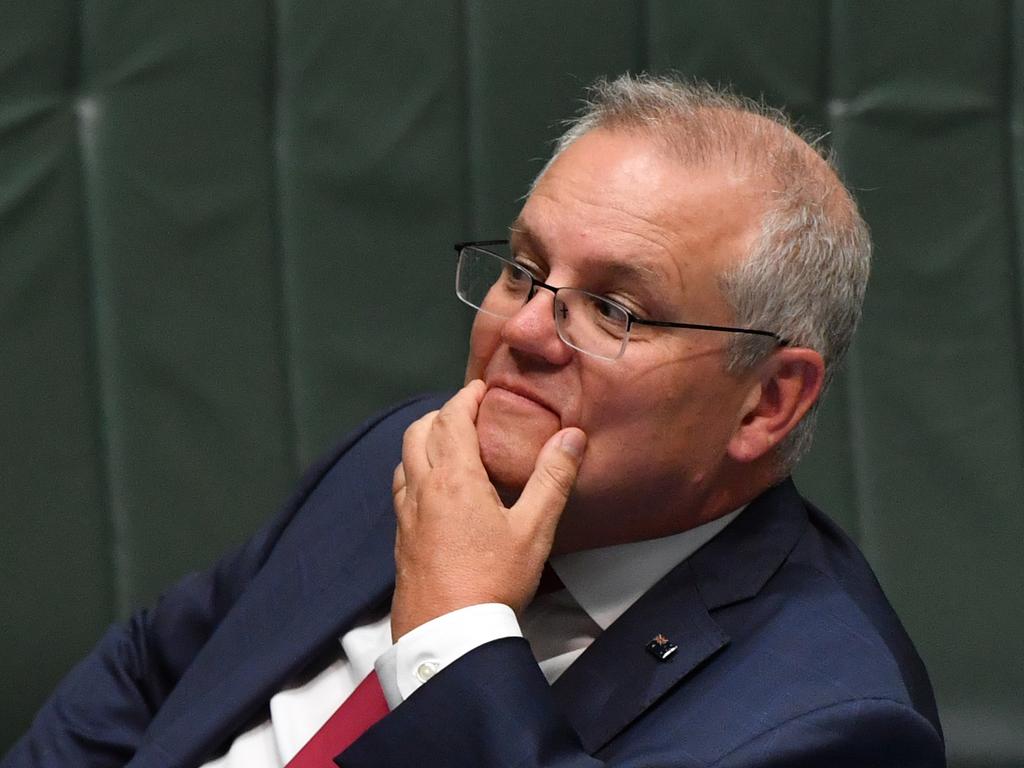Morrison’s path forward must include extensive reforms
At the macro level, it is easy to see why the Coalition wants to rein in spending like JobKeeper. But at the micro level, are voters ready?

There is no doubt that on the jobs front the economy has snapped back far more quickly than anybody anticipated.
The Coalition promised to begin tightening the fiscal belt once the unemployment rate had a five in front of it, which few thought possible this year. That commitment was made at a time when Scott Morrison seemed unbeatable at the next election.
While that is likely still the case, he is certainly now facing a multitude of challenges that weren’t present during the pandemic. Fiscal conservatism isn’t popular at the individual level. Not when it means someone loses benefits or sees spending in other spheres not being contained.
At the end of this month, JobKeeper formally comes to an end, which on some estimates could force half a million Australians onto unemployment benefits virtually overnight. That is unlikely, but there will be a sizeable uptick in the rate. At the very least it won’t continue to have a five in front of it.
It is easy to forget that initial pandemic estimates for unemployment foresaw it rising into double digits and staying there for some time. Who can forget the scenes of so many Australians linking up at Centrelink offices around the country when the lockdown started?
The Treasurer used colourful rhetoric to justify the size of spending during the pandemic designed to keep people in jobs. Josh Frydenberg talked about the unemployment rate going up the elevator and only coming back down via the stairs.
This was also Labor’s argument for widening the ambit of JobKeeper to include more casual workers, for example. Now it is their argument for extending it. Within this policy debate there isn’t a great deal of room politically for the Coalition to simplistically label Labor as profligate irresponsible economic managers.
At the macro level, it is easy to see why the Coalition government is keen to rein in spending on schemes such as JobKeeper. With the budget just over the horizon, it wants to shrink the role of government within the economy. Doing so is supposed to be in the DNA of Liberals. But at the micro level, do voters want that right now? Probably not. And might the law of unintended consequences kick in if the withdrawal of JobKeeper not only adds to the unemployment queues, it withdraws valuable dollars from the economy at a time when growing our way out of debt is the best (and perhaps only) option?
Arguments about underpinning economic stimulus — even via the build up of debt — have long been the easy retort to fiscal conservatism informing spending cuts. These are weighty decisions and there are no perfect solutions. Whichever way policy makers go there will be consequences, good and bad. No amount of modelling can foresee the right path.
And we are forced to have this debate in a climate which requires reform yet sees people uninterested in it. Reform is hard, just ask Bill Shorten who championed a collection of reform measures at the last election and was crucified. Or Julia Gillard, who introduced a price on carbon only to be vilified for it, prised out of the prime ministership.
Just ask John Howard, who in his first term, after reforming the waterfront and the wider industrial relations system, announced his intention to legislate a consumption tax, only to see his thumping 1996 majority whittled back at the 1998 election.
Reform wasn’t easy for Bob Hawke and Paul Keating either. Despite the Coalition agreeing with parts of their micro-economic agenda, they opposed many others parts of it, as did the business community. Hawke and Keating also had to battle dissent within the trade union movement every step of the way.
Gough Whitlam’s social reforms in the 1970s were so cataclysmic that conservatives used to being in power manufactured a constitutional crisis to remove him from office.
The point is that reform is hard and always has been, but it has never been harder than in the era we are living in: social media, 24 hour news, activist journalism and silo-based audiences. Yet the need for reform has never been greater than it is right now, and the economy is far from the only policy area needing change.
The legal system has long failed sexual assault victims, women in particular, leading to a movement that won’t go away and nor should it. With changes to how we do business, we need new industrial relations laws. The rise and rise of social media is requiring law makers to respond to what that means for everything from the dissemination of news to people’s rights to privacy and protection from vilification.
On the international front, the rise of China is forcing a rethink to how democratic nations conduct their foreign policy. Protections against cyber threats is certainly an area of reform in focus. Global trade is perhaps another.
Did anyone notice climate change and energy policy are areas in need of serious reform too? These arguably sit at the top of the priority list. But it doesn’t end there. Inequality continues to rise, stoking social discontent which leads to distrust towards institutions. In turn, politicians and bureaucrats have gone from respected actors to diminished figures. Faith in due process has been severely eroded, not always unfairly.
Which brings us to the public sphere: who in their right mind would want a career in that space right now? The challenges to be addressed are great, the solutions unclear.
In the case of politicians, they are poorly paid relative to what many of them (certainly the good ones) could earn were they to choose a quieter life away from public attacks.
But we need the best and the brightest to go there, because without them we won’t push through the era we are living in with the reforms we need to ensure future prosperity.
Indeed, the threats to democracy, external and internal, are growing. So much so that tertiary students polled on the importance of democratic rights don’t see them as the priority educated classes once did.
Peter van Onselen is a professor of politics and public policy at the University of Western Australia and Griffith University.







It’s the economy stupid, but you’d be stupid to think the economy is all that matters. This week’s fall in the unemployment rate was staggering. Staggeringly positive news. It dropped from 6.4 per cent to 5.8 per cent.